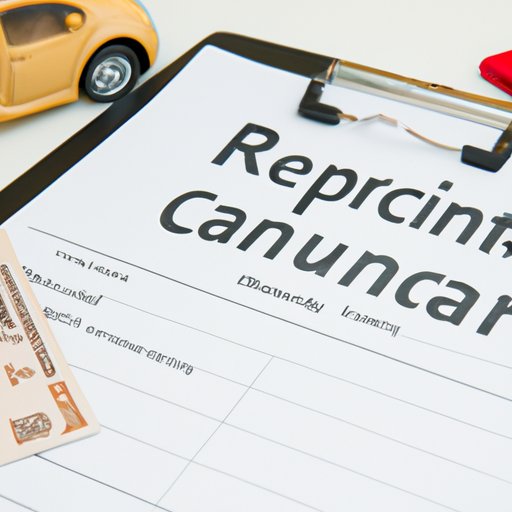Introduction
Financing a vehicle is a popular option for those who don’t have the cash to purchase a car outright. When you finance a vehicle, you make regular payments over an agreed-upon period of time until you’ve paid off the full loan amount plus any interest charges. But what happens if you can no longer afford your financed car? In this article, we’ll explore how to return a financed car, as well as the potential financial implications of doing so.
How to Return a Financed Car: A Step-by-Step Guide
If you need to return your financed car, there are several steps you’ll need to take. Here’s a step-by-step guide to help you through the process.
Contact Your Lender
The first step in the process of returning a financed car is to contact your lender. You should explain your situation and let them know that you intend to return the car. Your lender will then provide information on the next steps you need to take.
Understand Your Rights and Responsibilities
Once you’ve contacted your lender, you should also familiarize yourself with your rights and responsibilities in regards to the loan. This includes understanding the terms of the loan, any fees or penalties associated with returning the car, and any other relevant information.
Make Arrangements for Payment
Before you can return the car, you’ll need to make arrangements to pay off the remaining balance of the loan. Depending on your lender’s policies, you may be able to make a lump sum payment or set up a payment plan to pay off the balance.
Prepare to Hand Over the Vehicle
Once you’ve made arrangements for payment, the next step is to prepare to hand over the vehicle. This includes gathering all necessary documents (such as the title and registration) and making sure the car is in good condition. You should also arrange for a tow truck to pick up the car from your location.
What to Do When You Can No Longer Afford Your Financed Car
If you find yourself in a situation where you can no longer afford your financed car, there are several options available to you. Here are a few of the most common.
Negotiate an Early Repayment
One option is to negotiate an early repayment with your lender. This can be a good option if you have the funds available to pay off the loan in one lump sum. However, it’s important to know that some lenders may charge a prepayment penalty for paying off the loan early.
Trade or Sell the Vehicle
Another option is to trade or sell the vehicle. This can be a good way to recoup some of your money, but it’s important to keep in mind that you may still be responsible for any remaining balance on the loan after the sale.
Voluntarily Surrender the Vehicle
Finally, you can voluntarily surrender the vehicle. This means you turn the car over to the lender and agree not to make any further payments. It’s important to note that this option can have a negative impact on your credit score, so it’s best to explore other options before resorting to this one.
The Process of Returning a Financed Car
Once you’ve decided to return your financed car, there are several steps you’ll need to take. Here’s an overview of the process.
Contact Your Lender
As mentioned earlier, the first step is to contact your lender and let them know that you intend to return the car. Your lender will provide information on the next steps you need to take.
Collect the Necessary Documents
You’ll need to gather all necessary documents related to the loan, such as the title and registration. These documents will need to be signed by both you and the lender.
Pay Any Remaining Balances
You’ll also need to pay any remaining balances on the loan. Depending on your lender’s policies, you may be able to make a lump sum payment or set up a payment plan to pay off the balance.
Sign the Documents
Once all of the documents have been gathered and any remaining balances have been paid, you’ll need to sign the documents. This will officially transfer ownership of the car back to the lender.
Hand Over the Vehicle
Finally, you’ll need to hand over the vehicle. This can be done in person or via a tow truck. Be sure to collect any personal items that may have been left in the car prior to handing over the keys.

Navigating the Complexities of Returning a Financed Vehicle
Returning a financed car can be a complex process, and there are several factors to consider. Here are a few tips to help you navigate the complexities of the process.
Be Prepared for the Financial Implications
It’s important to understand the financial implications of returning a financed car. This includes understanding any fees or penalties associated with returning the car, as well as the potential impact on your credit score.
Consider Refinancing
If you’re struggling to make payments on your car loan, you may want to consider refinancing. This can be a good way to lower your monthly payments and make the loan more manageable.
Take Advantage of Legal Protections
Finally, be sure to take advantage of any legal protections that may apply to your situation. For example, some states have laws that limit the amount of interest a lender can charge on a loan.

Tips for Returning a Financed Car
Here are a few tips to help you through the process of returning a financed car.
Do Your Research
Before you begin the process, it’s important to do your research. This includes understanding your rights and responsibilities as well as any fees or penalties associated with returning the car.
Communicate with Your Lender
It’s also important to communicate with your lender throughout the process. Let them know what your plans are and be sure to ask any questions you may have.
Have a Plan in Place
Finally, it’s important to have a plan in place for what you’ll do after returning the car. This could include saving for a new car, taking public transportation, or using ride-sharing services.

Understanding the Financial Implications of Returning a Financed Car
Returning a financed car can have a significant impact on your finances. Here are a few things to consider.
What Happens to Your Credit Score?
Returning a financed car can have a negative impact on your credit score. This is because it’s seen as a sign of financial instability, so it’s important to be aware of this potential consequence.
What Are the Penalties for Returning a Car?
Depending on your lender’s policies, you may be subject to certain penalties for returning a car. This could include a prepayment penalty or a late fee, so it’s important to understand these potential costs before making a decision.
Is It Worth Keeping the Car?
Finally, it’s important to consider whether it’s worth keeping the car. If you’re struggling to make payments, it may be best to return the car and explore other options.
Conclusion
Returning a financed car is a complex process with many potential financial implications. It’s important to understand the process, the potential penalties, and the impact on your credit score before making a decision. Additionally, be sure to communicate with your lender and have a plan in place for what you’ll do after returning the car. By following these tips, you can ensure a smooth transition and minimize any potential financial consequences.
(Note: Is this article not meeting your expectations? Do you have knowledge or insights to share? Unlock new opportunities and expand your reach by joining our authors team. Click Registration to join us and share your expertise with our readers.)
